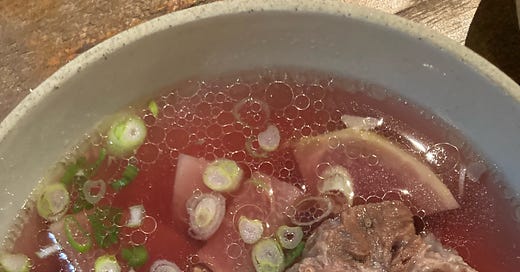Oxtail soup, and the comforts of the austere.
Adapted from: kkori gomtang, the simple Korean soup.
I am once again finding myself thinking about comfort. Or rather, it’s been finding me. The threat of its absence follows me around like a phantom pain, tucked in the footnotes of every news article, blended into the shadows of this grey winter. Maybe it’s the omnipresence of reminders that permeate this season: aspirations of coziness and hygge, warmth, cheer. We’re not supposed to feel cold or lonely between December 24 and January 1, I gathered. The closer we got to Christmas, the more imperative that felt.
To me, it’s always been just another week on the calendar. This year, especially: I saw my family framed in small Zoom boxes and old friends appear as blue text bubbles. This does not equate to an absence of comfort, despite how it sounds. If anything, it’s by design. Because the sense of comfort that I’m after, the kind that’s been eluding me lately, is the comfort of my own company.
Much has been written about loneliness and connection, but little about how true loneliess emerges when you’ve lost the connection to yourself. The past few months have shown me that I have forgotten how to be alone (an act of self-betrayal for a lifelong introvert) and enjoy the timbre of my own thoughts. Instead, I chose the noise: the chatter of others, the snappy banter of TV shows, the staccato of endless TikTok sounds. I knew this rabid pursuit of novelty, pleasure and distraction as a response to the lockdown had an expiration date; I didn’t know that day would come so soon. Here we are again, just me, myself, and the occasional swish of Emile’s tail as he emerges from another nap.
Ever the dutiful pendulum, I am finding myself swinging towards the monastic as a source of comfort. Empty spaces, silent days, simple foods. Despite what the dictionary might say, I don’t think austerity and comfort are at odds; if anything, they reinforce one another. Poverty cooking taught us that. Chicken Soup for the Soul did too. One can have little and find abundance in it. Isn’t that the ultimate goal?
Kkori gomtang exemplifies this thinking. It’s a classic Korean staple, a simple oxtail and radish soup seasoned only with salt, green onions, and garlic, served with rice on the side. (In some places, it’s served without any seasoning, so you can adjust to taste.) Soups are at the heart of Korean cuisine; according to one Michelin guide writer, “Should soup be absent from the dinner table for whatever reason, expect Koreans to complain that ‘something is missing’ and that they feel like ‘they haven’t eaten well.’” I can relate.
Poetic, isn’t it, that the soups capable of warming us to the bone are also the ones made from bones? From the elemental we came, and to it we’ll return. Growing up, it was impressed upon me endlessly that bone broths are the antidote to just about anything: colds, acne, ennui. I haven’t yet seen anyone disprove this theory. Drinking oxtail soup, I am my whole self—present, satisfied, fulfilled. I forget how little it takes.
It reminds me of a fantasy I used to have, in which I would live in a tiny house by myself, surrounded by just one of everything. One desk, one chair, one bowl, one spoon. Just enough, in other words, for one of me. In that dream, I never felt lonely.
Recipe notes:
Oxtail soup from Maangchi
With the Instant Pot guidance of this recipe from What Great Grandma Ate
I made this using watermelon radishes—the last harvest from my CSA this year—which regrettably turned my soup purple, but they work well as a daikon substitute. Was too lazy to make the optional seasoning paste, but could see a bit of spice and depth adding to the comfort factor.
Everything I’ve read about the Korean preparation of oxtail emphasizes the importance of soaking and blanching the bones beforehand. Do not skip this step!!! The clarity of broth is key.
Watch the world’s cutest grandma make a version of this on Future Neighbor’s channel.
I wish you the luxury of enjoying your own company.
See you in 2022,
Tracy



